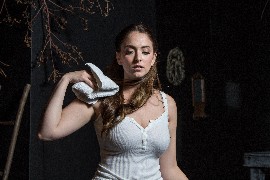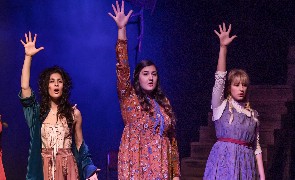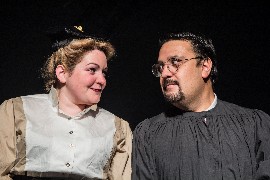
Director-choreographer-designer Madeleine Heil reinvents Broadway’s Best Musical Tony winner Spring Awakening so sensationally at NoHo’s Cupcake Theater, it’s easily one of the two or three finest of the dozen productions I’ve seen so far.
The Duncan Sheik-Steven Sater adaptation of German playwright Frank Wedekind’s 1906 drama Frühlings Erwachen broke new musical theater ground back in 2007 by tackling such edgy topics as child abuse, S&M, incest, abortion, and suicide among teenagers just now awakening to their sexuality.
Sater’s streamlining of Wedekind’s melodramatic storylines, singer-songwriter-pop star Sheik’s catchy alternative rock score, and Bill T. Jones’ brilliantly innovative choreography all combined to make Spring Awakening a Broadway hit.
 The show begins quietly, with innocent but sexually inquisitive girl-next-door Wendla wondering if she’ll ever be told the truth about man-woman relations in “Mama Who Bore Me.”
The show begins quietly, with innocent but sexually inquisitive girl-next-door Wendla wondering if she’ll ever be told the truth about man-woman relations in “Mama Who Bore Me.”
Before long, however, the song has taken on a girl-band rock beat echoed by the boys when handsome, popular, self-confident Melchior and introverted, inhibited, wet-dream-plagued Moritz’s Latin class suddenly erupts into the testosterone-fueled chords of “The Bitch Of Living” and later in a full-cast showstopper (“Totally Fucked”) that reveals the teens’ raging desires, their unfulfilled sexual wants, and their dissatisfaction with the world around them.
 Without these musical numbers and The Pink Floyd-esque “Touch Me,” the anthem-like “I Believe,” and the heartbreaking “Left Behind,” Spring Awakening would simply be an abbreviated version of a dated German play. With them, it becomes something both extraordinary and contemporary, as if 21st-century souls were inhabiting these long-deceased youths.
Without these musical numbers and The Pink Floyd-esque “Touch Me,” the anthem-like “I Believe,” and the heartbreaking “Left Behind,” Spring Awakening would simply be an abbreviated version of a dated German play. With them, it becomes something both extraordinary and contemporary, as if 21st-century souls were inhabiting these long-deceased youths.
 Audiences discovering Spring Awakening for the first time could not be given a finer introduction than Cupcake Theater’s, and even those who’ve seen it again and again will feel they are discovering it for the first time thanks to the multiple-hats-wearing Heil.
Audiences discovering Spring Awakening for the first time could not be given a finer introduction than Cupcake Theater’s, and even those who’ve seen it again and again will feel they are discovering it for the first time thanks to the multiple-hats-wearing Heil.
 Among the director’s inspired touches are the early-on Introduction of teen runaway Ilse as the physical personification of the erotic dream that’s been keeping Moritz up at night; a particularly inventive use of writing slates and chalk in “The Bitch of Living; a “Touch Me” that doesn’t go for the obvious tactile self-exploration; a ballet sequence depicting in dance the sexual abuse Martha sings about in “The Dark I Know Well”; a suicide that takes its deliberate, edge-of-your-seat time to unfold; a funeral sequence staged with the deceased still a palpable physical presence and candles taking the place of flowers to powerful visual effect; an Our Town-inspired graveyard scene in which the dead are still physically present, providing not just a pair of surprise reveals but allowing a seamless transition into the musical’s pivotal final will-he-or-won’t-he sequence; and the show-closing “The Song of Purple Summer,” no longer a tacked-on coda but an extension of the musical’s climactic scene.
Among the director’s inspired touches are the early-on Introduction of teen runaway Ilse as the physical personification of the erotic dream that’s been keeping Moritz up at night; a particularly inventive use of writing slates and chalk in “The Bitch of Living; a “Touch Me” that doesn’t go for the obvious tactile self-exploration; a ballet sequence depicting in dance the sexual abuse Martha sings about in “The Dark I Know Well”; a suicide that takes its deliberate, edge-of-your-seat time to unfold; a funeral sequence staged with the deceased still a palpable physical presence and candles taking the place of flowers to powerful visual effect; an Our Town-inspired graveyard scene in which the dead are still physically present, providing not just a pair of surprise reveals but allowing a seamless transition into the musical’s pivotal final will-he-or-won’t-he sequence; and the show-closing “The Song of Purple Summer,” no longer a tacked-on coda but an extension of the musical’s climactic scene.
 Heil’s choreography dazzles throughout, dances that have each teenage character expressing personal demons and desires uniquely his or her own.
Heil’s choreography dazzles throughout, dances that have each teenage character expressing personal demons and desires uniquely his or her own.
And Heil’s contributions do not end there. The production’s starkly beautiful scenic design–straight-back chairs and bare-branched trees, a moveable staircase, and some giant-sized alphabet blocks inventively used–is hers as well, and so are the production’s just-right period costumes co-designed with Page Ridgeway, all of the above dramatically lit by Chris Wehba.
Performances* are among the best of the hundreds I’ve seen playing these roles beginning with a standout pair of male leads.

 Evan Marshall gives Melchior boyish, Aryan-ideal looks, most-popular-student charisma, a hint of danger, and exquisite tenor/countertenor pipes while a particularly memorable Robert Manion digs deep into Moritz’s aching self-doubts, sings gorgeously, and hides his native Aussie accent to perfection.
Evan Marshall gives Melchior boyish, Aryan-ideal looks, most-popular-student charisma, a hint of danger, and exquisite tenor/countertenor pipes while a particularly memorable Robert Manion digs deep into Moritz’s aching self-doubts, sings gorgeously, and hides his native Aussie accent to perfection.
The lovely Kelly Hancock reveals Wendla’s naivete and blooming young womanhood, Natalie Llerena makes for an absolutely stunning Isle, Randi DeMarco is heartbreaking as the physically abused Martha, and all three sing splendidly, Hancock in “Mama Who Bore Me,” Llerena in “Blue Wind” and “The Song Of Purple Summer,” and DeMarco in a “The Dark I Know Well” that starts out a whisper and ends up a desperate cry for help.
As for Hunky Hanschen and Earnest Ernst, not only are the musical’s bi-gay boys in the able hands of Tristen Ross and Ryan Axberg, their “The Word Of Your Body” is as funny as it is touching, downright sexy, and played without an iota of ridicule.
 Rehyan Rivera’s horny hetero Georg stands out among an all-around-terrific supporting ensemble composed of Logan Allison, Isaiah Griffith (Otto), Ridgeway (Thea understudy), Megan Stys, Jasper Thomas, and Julia Williams (Anna understudy).
Rehyan Rivera’s horny hetero Georg stands out among an all-around-terrific supporting ensemble composed of Logan Allison, Isaiah Griffith (Otto), Ridgeway (Thea understudy), Megan Stys, Jasper Thomas, and Julia Williams (Anna understudy).
 Danny Guerrero and an especially fine Kris DJ Robinson delineate a dozen or so adult characters.
Danny Guerrero and an especially fine Kris DJ Robinson delineate a dozen or so adult characters.
Musical director Lauralie Pow conducts and plays keyboards in Spring Awakening’s pitch-perfect five-piece band, vocals and instrumentals expertly mixed by sound designer Sean Petersen.
Spring Awakening is produced by Michael Pettenato. Griffith is production assistant. Ridgeway is stage manager.
Past Cupcake musicals had me anticipating a top-notch production, but nothing could have prepared me for the absolute brilliance of their latest gem. This Spring Awakening is truly in a class by itself.
*Some roles are double cast, with Trae Adair, Daniel Bruington, Amber France, Mandie Hittleman, Lindsay Heather Pearce, and Thomas Adoue Polk taking over at alternate performances, though without a lobby posting or program inserts, audiences will be forced to guess at whom they’re seeing at any given show.
Cupcake Theater, 11020 Magnolia Blvd., North Hollywood.
www.cupcaketheater.com
–Steven Stanley
May 19, 2018
Photos: JDC Photography
Tags: Cupcake Theater, Duncan ShEIk, Los Angeles Theater Review, Steven Sater



 Since 2007, Steven Stanley's StageSceneLA.com has spotlighted the best in Southern California theater via reviews, interviews, and its annual StageSceneLA Scenies.
Since 2007, Steven Stanley's StageSceneLA.com has spotlighted the best in Southern California theater via reviews, interviews, and its annual StageSceneLA Scenies.







 COPYRIGHT 2025 STEVEN STANLEY :: DESIGN BY
COPYRIGHT 2025 STEVEN STANLEY :: DESIGN BY